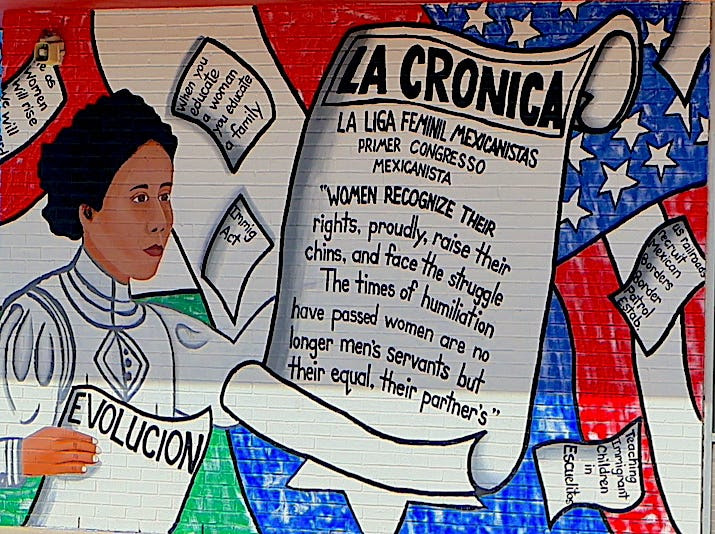On March 9, a mural recognizing Women’s History Month and honoring Latina civil rights and political activist, Jovita Idar, was unveiled on a Frio Street building west of downtown San Antonio. Idar was a leader in Texas for women’s rights and a thirty-year resident of the city. In 1911, she founded La Liga Femenil Mexicanista, one of the first Latina feminist organizations in the United States.
The mural, sponsored by “Las Esperanzas y Justicias de la Ave Negra,” the Mexican American Civil Rights Institute [MACRI], and Dress for Success San Antonio, is the 64th mural completed by San Anto Cultural Arts. The March 9 dedication ceremony and blessing of the mural were planned to coincide with Women’s History Month and International Women’s Day.
International Women’s Day has broad objectives celebrating women’s social, economic, cultural, and political achievements. But this important International Women’s Day event also opens the door to educating women and raising awareness about women’s equality. In addition, this influential movement calls for positive change in advancing women in all areas and has led to the celebration of Women’s History Month.
The first gathering calling for women across the globe to organize began in 1911 in Western Europe. That initial call for action brought more than a million women and men together in several European capitals. The earliest campaigns called for “women’s right to work, vote, be trained, to hold public office, and an end to discrimination.” Among the early Latinas fighting for the right to vote and for justice and fairness in the workplace was the native of South Texas, Jovita Idar.
Idar is an important historical figure, not only for Texans but also for Latinas in the Americas. Born in Laredo in 1885, Idar earned a teaching certificate in 1903 and taught in a small school near Laredo. She left teaching after a few years to join her father and two brothers as a writer for her father’s weekly newspaper, La Cronica.
When the Mexican Revolution broke out in 1910, Idar crossed the border and joined La Cruz Blanca, a medical group similar to the Red Cross. Idar served as a nurse but returned to Laredo in 1911 to continue her work for progressive political policies. She joined her father in writing articles in La Cronica about the plight of Mexican American children in Texas.
Much is known about the efforts of European women organizing for equality, but until recent times, little has been written about the founding of organizations by Latina women seeking similar objectives in the United States. In 1911, Jovita Idar spearheaded a feminist movement in South Texas that called for women to be equal partners with men. The intrepid feminist Idar of Laredo founded the Liga Femenil Mexicanista in 1911. Maria-Cristina Garcia wrote that the Liga “is one of the first-known attempts by Mexican American women to unite for a social and political cause.”
Idar’s 1914 editorial criticizing President Woodrow Wilson’s decision to send U.S. military forces into Mexico in search of Francisco Villa landed her in trouble with Texas law officials. The Texas governor ordered the Texas Rangers to shut down El Progreso, the newspaper where she worked with her brothers. When the Rangers arrived at the newspaper office, Idar blocked the door and prevented the Rangers from entering. The Rangers later returned and permanently damaged the printing equipment.
Idar moved to San Antonio in 1917 and lived in the city’s Westside from the time of her marriage that year until she died in 1946. During that time, she established a free kindergarten program and volunteered as an interpreter for Spanish-speaking patients at the San Antonio County Hospital near her home on Frio Street. Her home in the 1940s was not far from the location of the mural now dedicated in her honor.
The mural honoring Jovita Idra was completed by the San Anto Cultural Arts with lead artist Rosalinda Alvarez Turuda assisted by Adrian Alvarez. A statement painted on the mural reads: ‘Women are no longer men’s servants but their equals, their partners.’ The mural depicts a Latina woman next to the proclamation titled “La Cronica” with the subheading “La Liga Feminil Mexicanistas Primer Congresso Mexicanista.”
Another cultural event honoring Women’s History Month is a Latina art exhibit titled “Las Mujeres de Aztlan: Persistent and Resilient ” at Centro Cultural Aztlan located in the Westside neighborhood in San Antonio, Texas
The 15th Annual Las Mujeres de Aztlan exhibition opened on Friday evening March 8th at the Centro Cultural Aztlan. Curators Malena Gonzalez-Cid and Ruth Guajardo noted that this year’s exhibition focuses on the resilience and persistence of women. Santa Barraza of Kingsville, Texas, Liliana Wilson of Boerne, Texas, and two San Antonio sisters Manola, and Maria Ramirez, of Southtown are among the 27 artists in this year’s show.
In 1990, Barraza shared her artistic approach and philosophy with curators of a large exhibit, Chicano Art: Resistance and Affirmation [A UCLA Exhibit]. Barraza wrote: “I am interested in borders as regions of appropriation. I appropriated pre-Columbian symbols and myths as well as historical and contemporary symbols as mechanisms for resistance to oppression and assimilation.”
For the San Antonio Las Mujeres exhibit, Barraza remained true to her earlier philosophy. “ In her new work, “Codex of Maternal Abuelos/Grandparents,” Barraza explained that the entire format of the painting “is an appropriation of the pre-Columbian codices.” She added that in her art pieces in the exhibit, her grandparents are “surrounded by a simple, flat landscape, typical of the Mesoamerican codices, and also reminiscent of South Texas.”
Barraza recently retired from teaching at Texas A&M Kingsville and remains committed to her art. She has also opened an art gallery and studio in the downtown center of Kingsville to show Latino art and to continue her dedication to promoting images of cultural interpretations and affirmation. As a Chicano feminist and cultural interpreter, Barraza features modern visual presentations including labor leader Emma Tennayuca, singers Selena and Lydia Mendoza, and the Soldaderas of the Mexican Revolution.
Latina artist Liliana Wilson, born in Valparaiso, Chile, and now residing north of San Antonio, is known for portraying immigrants and working-class people in her art. As a first-generation Latina immigrant, she addresses her concerns for the plight of humanity by looking at global issues such as migration, climate change, and social justice.
Her work has always championed social justice and opposition to oppression and violence. Today, she continues to touch on global themes. Viewers find in many of her paintings a compassion for the poor, the hungry, and those living under oppressive political regimes.
Although she seems driven by a desire to speak for those without access to power and wealth, Liliana’s work also shows a desire to understand common individuals’ struggles with despair, fear, and hopelessness
The Southtown sisters, Manola and Maria Ramirez, began art training when Maria convinced her older sister Manola to take a life drawing art class with her at San Antonio College [SAC] ten years ago. Maria began her art training in the city’s Say Si youth art program and saw art as a possible career.
The Life Drawing class at SAC proved transformational to Manola. Her art teachers commented on her creative talent and encouraged her to seek an art degree. After two years at SAC, the Ramirez sisters transferred to The University of Texas at Austin and graduated with Bachelor of Art degrees in 2018.
The Ramirez sisters, Manola and Maria sisters operate an all-female collaborative space known as Lavaca Studios in Southtown, San Antonio. There they create, teach, and provide artistic resources to the community.
The mural dedication to Jovita Idar and the Las Mujeres exhibit at the Centro Cultural Aztlan demonstrate a desire by Latina women artists to address the historical omission of women in history and the arts.









